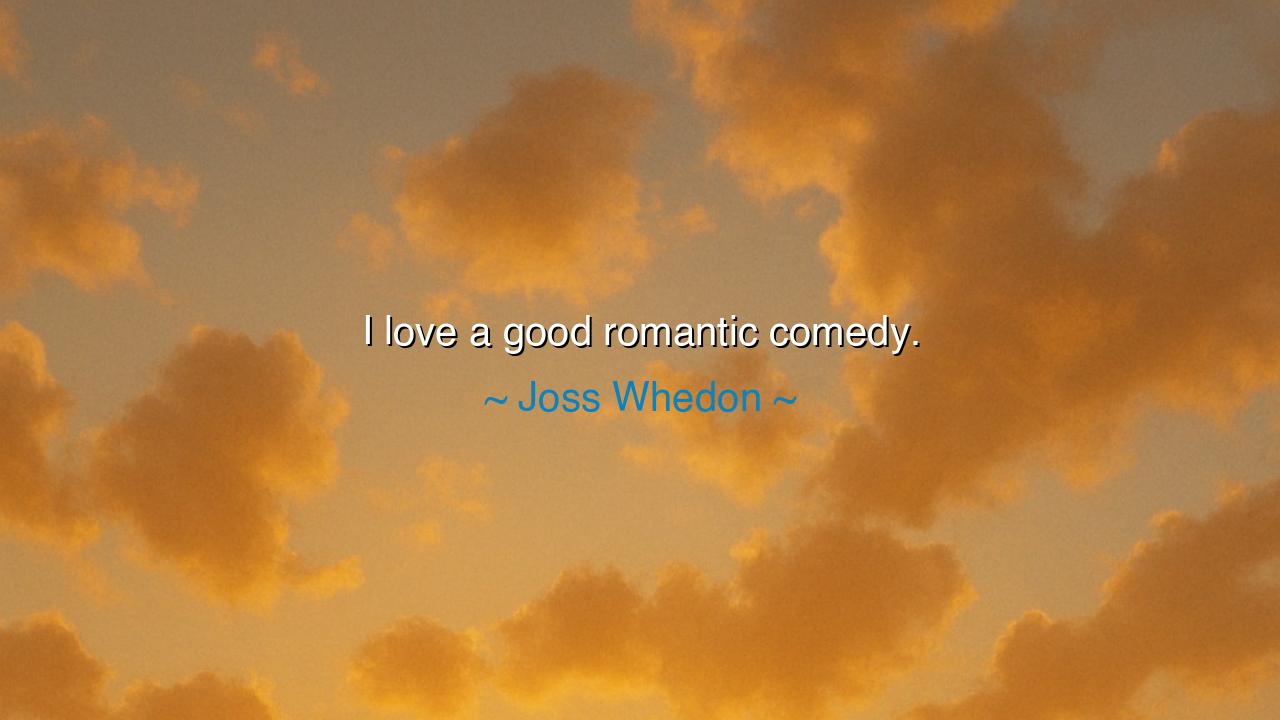
I love a good romantic comedy.






The words of Joss Whedon—“I love a good romantic comedy”—may appear simple, but within them lies a testimony to one of humanity’s most enduring art forms. To love a romantic comedy is to love the laughter and tenderness of the human heart, the awkwardness of longing, the clash of misunderstandings, and the joy of reconciliation. These stories are not merely entertainments; they are mirrors of the timeless pursuit of love and belonging, clothed in humor and lightness so that even the heaviest truths may be carried with ease.
The origin of the romantic comedy stretches back far into the past. The ancients themselves cherished these tales. The plays of Aristophanes in Greece, though comedic, often contained elements of love tangled in folly, only to be resolved with laughter. In Rome, Plautus and Terence crafted comedies of mistaken identity, love delayed, and joyous endings, planting the seeds for all who would follow. Even Shakespeare, centuries later, carried forward this torch in works like Much Ado About Nothing and Twelfth Night, where wit and romance danced together. Thus, when Whedon declares his love for the genre, he is aligning himself with a tradition older than empires, a tradition that speaks to every generation.
The beauty of a romantic comedy lies not in perfection, but in imperfection. Lovers stumble, words fail, and circumstances conspire, yet from this chaos arises connection. We laugh at the mistakes because they are our own. We cheer at the reunion because we, too, long to believe that despite our flaws, love will find its way to us. The genre’s true strength is that it dignifies the ordinary, showing that love is not only for heroes and saints, but for the clumsy, the uncertain, the human.
History provides luminous examples of this pattern. Consider the story of Elizabeth Bennet and Mr. Darcy in Jane Austen’s Pride and Prejudice. Though often framed as a romance, it bears all the hallmarks of comedy—misunderstandings, pride, stubbornness, and the eventual joy of recognition. Austen’s genius lay in showing that even the most flawed beginnings can blossom into enduring love. Her tale has endured because it carries the same truth that Whedon recognizes: the romantic comedy is not shallow escapism, but a profound celebration of human resilience in love.
Whedon’s statement also reveals a deeper yearning. To say “I love a good romantic comedy” is to confess the desire for stories where love triumphs, where joy follows struggle, and where laughter heals. In a world that often overwhelms us with tragedy, cynicism, and conflict, these tales are medicine for the spirit. They remind us that hope is not foolish, that tenderness is not weakness, and that humor is one of love’s greatest companions.
The lesson for us is this: never scorn the simple joys. Romantic comedies may seem light, but their lightness is what gives them strength. They teach us to laugh at ourselves, to forgive quickly, to hope fiercely, and to believe that love—though challenged—will endure. To embrace them is to embrace the softer, kinder side of life that too often gets buried beneath the weight of duty and sorrow.
Practically, this means allowing space for joy and playfulness in our own lives. Laugh with those you love. Do not be afraid to stumble or to look foolish, for often these are the very moments that bring hearts together. Seek stories and experiences that lighten your spirit, and let them remind you that life is not only survival but celebration.
Thus, Whedon’s words echo as both confession and teaching. To love a romantic comedy is to affirm faith in love, laughter, and humanity itself. And so let this truth be handed down: cherish the stories that make you laugh and believe, for they carry within them the wisdom of the ages—that love, in all its imperfection, is the greatest joy we are given.






AAdministratorAdministrator
Welcome, honored guests. Please leave a comment, we will respond soon